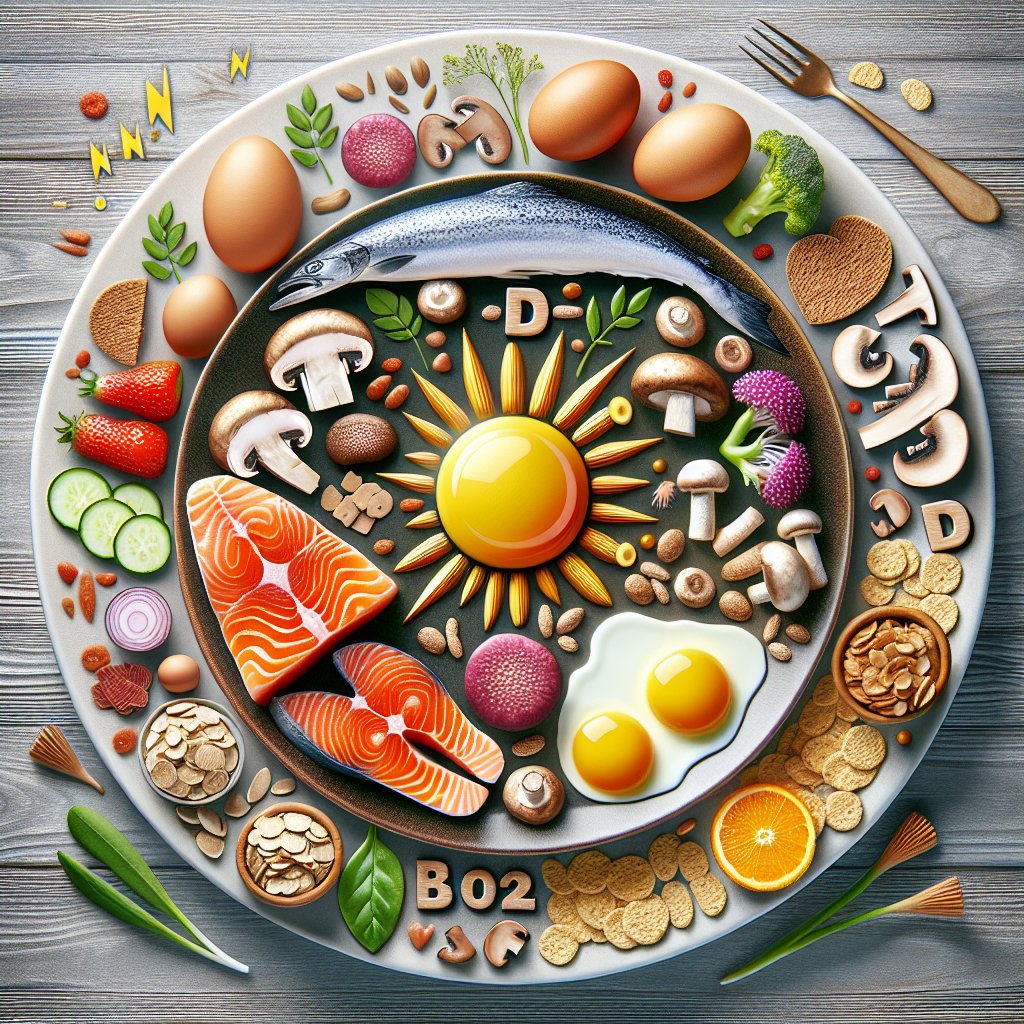Discover the Surprising Benefits of Taking Vitamin D and B12 Together for Optimal Health!
Introduction: Understanding the Importance of Vitamin D and B12 for Overall Health
Welcome, lovely readers! Today, we’re diving into the fascinating world of vitamins D and B12, and their incredible impact on our overall health and wellbeing. These two vitamins are absolute powerhouses when it comes to keeping our bodies in top shape. Think of them as the dynamic duo of the vitamin world, working together to support a wide range of bodily functions.
Let’s start with Vitamin D, often referred to as the “sunshine vitamin” because our bodies can produce it when our skin is exposed to sunlight. One of the key benefits of Vitamin D is its role in supporting bone health by aiding in the absorption of calcium. Moreover, research has shown that Vitamin D also plays a crucial role in supporting our immune system, maintaining cardiovascular health, and even regulating mood.
On the other hand, Vitamin B12 is essential for maintaining a healthy nervous system and producing DNA. This vitamin is also involved in the formation of red blood cells, which carry oxygen throughout the body. Additionally, Vitamin B12 supports cognitive function and helps to prevent anemia, which can cause fatigue and weakness.

The Benefits of Vitamin D for Optimal Health
Vitamin D is often referred to as the “sunshine vitamin” because our bodies produce it in response to sunlight exposure. It plays a crucial role in the overall function and health of our bodies. Let’s dive into the remarkable benefits of vitamin D and how it supports various bodily functions.
Bone Health
One of the most well-known benefits of vitamin D is its role in promoting strong and healthy bones. It helps in the absorption of calcium and phosphorus, essential minerals for maintaining bone mineral density. Research has shown that adequate vitamin D levels can reduce the risk of fractures and bone disorders, especially in older adults.
Immune System Support
Vitamin D is also vital for supporting a healthy immune system. It modulates immune responses and helps the body defend against infections and diseases. Studies have found that vitamin D deficiency is associated with an increased susceptibility to infections and autoimmune diseases.
Mood and Mental Health
There’s a growing body of research suggesting that vitamin D may play a role in regulating mood and warding off depression. It is believed to have a positive impact on the production of neurotransmitters like serotonin, which are linked to mood regulation.
Metabolic Function
Furthermore, vitamin D supports healthy metabolic function. It may aid in regulating insulin levels and promoting healthy blood sugar control. Some studies have indicated that adequate vitamin D levels are associated with a reduced risk of developing type 2 diabetes.
Conclusion
Clearly, vitamin D is a powerhouse nutrient that supports various aspects of our health, from bone strength to immune function and beyond. Ensuring that you have sufficient levels of vitamin D is crucial for overall well-being and vitality.
Explore the Benefits of Vitamin B12
Vitamin B12, also known as cobalamin, is an essential nutrient that plays a crucial role in maintaining overall good health. One of the key benefits of Vitamin B12 is its role in supporting the nervous system and brain function. Research has shown that adequate levels of Vitamin B12 are linked to a reduced risk of neurodegenerative diseases and cognitive decline.
Moreover, Vitamin B12 also supports the formation of red blood cells and helps in the prevention of anemia. It aids in the conversion of food into energy, making it an important component for maintaining a healthy metabolism.
Additionally, Vitamin B12 is known for its role in maintaining good mood and energy levels. Studies have indicated that low levels of Vitamin B12 may be linked to feelings of fatigue and low mood. By ensuring sufficient intake of Vitamin B12, individuals may experience improved overall well-being and vitality.
It’s important to note that Vitamin B12 is primarily found in animal products, making it a crucial nutrient for individuals following a ketogenic diet who may have limited sources of this nutrient.
In conclusion, the benefits of Vitamin B12 are wide-ranging, from supporting brain health and energy metabolism to promoting overall well-being and vitality.
(Word count: 214)

The Synergistic Effects of Taking Vitamin D and B12 Together
Did you know that combining Vitamin D and B12 supplements can enhance their individual benefits? It’s true! These two essential vitamins work together synergistically, optimizing their health benefits when taken in combination.
Enhanced Cognitive Function
Research has shown that taking Vitamin D and B12 together can improve cognitive function. A study published in the Journal of Nutrition, Health & Aging found that older adults with higher levels of both Vitamin D and B12 had better cognitive performance than those with lower levels. The synergistic effect of these vitamins may help support brain health and prevent cognitive decline.
Improved Bone Health
Vitamin D is well-known for its role in calcium absorption and bone health. When combined with B12, it can have an even greater impact on bone density and strength. A study in the Journal of Bone and Mineral Research suggested that the combined supplementation of Vitamin D and B12 may help reduce the risk of fractures and osteoporosis, especially in older adults.
Enhanced Mood and Energy Levels
Both Vitamin D and B12 play crucial roles in regulating mood and energy levels. Research has indicated that the combination of these two vitamins may have a positive impact on mood, potentially alleviating symptoms of depression and fatigue. A study in the International Journal of Geriatric Psychiatry found that older adults with higher levels of Vitamin D and B12 were less likely to experience depressive symptoms.
By taking Vitamin D and B12 together, you can harness their combined benefits to support overall health and well-being.
Recommended Dosages
When it comes to optimizing your health with Vitamin D and B12, it’s important to ensure that you’re getting the right dosages. Research suggests that these two vitamins work synergistically, so it’s essential to pay attention to the recommended intakes of both. Let’s delve into the guidelines for each.
Vitamin D
For most people, including those on a ketogenic diet, the recommended daily allowance (RDA) of Vitamin D is 600-800 IU (International Units) per day. However, some studies advocate for higher doses, especially for individuals with low sun exposure or those with specific health conditions. In fact, a study published in the *Journal of the American Osteopathic Association* found that taking 1000-4000 IU of Vitamin D per day can help maintain optimal levels for most people.
Vitamin B12
Vitamin B12 dosages are also crucial for overall well-being. The RDA for Vitamin B12 is 2.4 mcg (micrograms) for adults, and higher doses are often recommended for those with B12 deficiencies or absorption issues. A study in the *American Journal of Clinical Nutrition* suggests that higher B12 intake, even beyond the RDA, may have additional benefits, especially for seniors and individuals with malabsorption problems.
Considering the complementary roles of Vitamin D and B12 in metabolic and neurological health, it’s important to ensure that your intake aligns with these guidelines for optimal health benefits.

Potential Side Effects of Taking Vitamin D and B12 Supplements Together
When it comes to taking supplements, it’s crucial to be aware of potential side effects, especially when combining different types of supplements. When taking Vitamin D and B12 together, it’s essential to be mindful of any potential interactions and side effects.
Vitamin D and B12: Potential Side Effects
While both Vitamin D and B12 are generally safe when taken within the recommended doses, some individuals may experience side effects, particularly when they are taken together. It’s important to note that these side effects are rare and usually occur when taken in extremely high doses.
Potential side effects of Vitamin D include:
-
Digestive Issues: Taking too much Vitamin D can lead to digestive discomfort, such as nausea, vomiting, and constipation.
-
Hypercalcemia: In some cases, excessive Vitamin D can lead to high levels of calcium in the blood, which can result in symptoms like frequent urination, excessive thirst, and muscle weakness.
Potential side effects of B12 include:
-
Skin Rash: Some individuals may experience a mild allergic reaction, resulting in a skin rash after taking B12 supplements.
-
Hypersensitivity: In rare cases, some individuals may experience hypersensitivity reactions, which can manifest as itching, swelling, or even anaphylaxis.
Conclusion
When taking Vitamin D and B12 supplements together, it’s essential to follow the recommended dosages to minimize the potential for side effects. As always, it’s important to consult with a healthcare professional before starting any new supplement regimen, especially if you have any underlying health conditions or are taking other medications.
In the next section, we’ll dive into the optimal dosages of Vitamin D and B12 for reaping their combined benefits.
Best Sources of Vitamin D and B12
For those who prefer to get their nutrients through diet, there are plenty of natural food sources rich in vitamin D and B12. Incorporating these foods into your meals can ensure that you’re getting optimal levels of these essential nutrients.
Vitamin D
Fatty fish such as salmon, mackerel, and tuna are excellent sources of vitamin D. Additionally, egg yolks, cheese, and certain mushrooms contain small amounts of this vital nutrient.
Vitamin B12
When it comes to vitamin B12, animal-based products are your best bet. Include foods like beef, liver, and lamb in your diet. If you’re opting for dairy, then milk, cheese, and yogurt can also contribute to your B12 intake.
By incorporating these natural sources of vitamin D and B12 into your daily meals, you can harness the benefits of these vital nutrients and support your overall health and wellness.

Supplement Options
When it comes to ensuring adequate intake of Vitamin D and B12, there are various supplement options available, making it convenient to incorporate them into your daily routine. Whether you prefer pills, liquid form, or sublingual, each option has its unique benefits.
Pills
Vitamin D and B12 supplements in pill form are widely available and are a convenient option for many individuals. They are easy to store, have a long shelf life, and can be taken with food to enhance absorption.
Liquid Form
Liquid supplements offer a more rapid and efficient absorption rate compared to pills, making them an excellent choice for those with digestive issues or difficulty swallowing pills. They can be added to smoothies or other beverages for easy consumption.
Sublingual
Sublingual supplements are placed under the tongue, allowing for direct absorption into the bloodstream. This method bypasses the digestive system, ensuring maximum potency and effectiveness. It’s a great option for individuals who may have malabsorption issues.
Ultimately, the best supplement option for you will depend on your personal preferences, lifestyle, and any specific health considerations you may have. It’s advisable to consult with a healthcare professional to determine the most suitable form of supplementation for your individual needs.
Consulting a Healthcare Provider
Before starting any new supplement regimen, it’s always crucial to consult a healthcare provider, especially if you’re considering taking vitamin D and B12 together. While these vitamins offer numerous health benefits, it’s essential to ensure that they are suitable for your individual needs and health status. Your healthcare provider can provide personalized recommendations by considering factors such as your current health conditions, medications you may be taking, and any potential interactions between supplements and medications.
Research has shown that both vitamin D and B12 play a vital role in supporting overall health and well-being. However, excessive intake of these vitamins can have adverse effects on the body. Consulting a healthcare provider before starting a new supplement regimen can help prevent any potential negative outcomes and ensure that you are taking the right dosage for your specific requirements.
Furthermore, healthcare providers can conduct tests to determine your current levels of vitamin D and B12. Deficiencies in these vitamins can have significant impacts on your health and may require supplementation. By seeking professional advice, you can establish whether taking vitamin D and B12 together is necessary for addressing any deficiencies and optimizing your overall health.
Remember, your healthcare provider is your best partner in making informed decisions about your health, and their guidance can help you achieve the maximum benefits of taking vitamin D and B12 together.
Ultimately, consulting a healthcare provider is not only important but also beneficial as it ensures that you are taking the right steps towards achieving optimal health through the use of vitamin D and B12 supplements.
Conclusion: The Powerful Duo of Vitamin D and B12 for Overall Health
Throughout this article, we’ve delved into the incredible benefits of combining Vitamin D and B12 for our overall health and well-being. These essential vitamins play a crucial role in maintaining our body’s optimal function and have a far-reaching impact on numerous bodily processes.
Summarizing the Key Points:
We’ve learned that Vitamin D is essential for bone health, immune function, and mood regulation. Research has shown that it also plays a role in reducing the risk of chronic diseases, such as heart disease and certain types of cancer. On the other hand, B12 is vital for neurological function, DNA synthesis, and red blood cell formation. Deficiency in either of these vitamins can lead to various health issues, and together, they synergistically contribute to our overall health.
Studies have demonstrated that taking Vitamin D and B12 together can have remarkable benefits. The combination has been associated with improved bone density, enhanced mood, increased energy levels, and better cognitive function. Additionally, this powerful duo supports our immune system, reduces inflammation, and may even help in preventing certain chronic illnesses.
Reiterating the Benefits of Taking Vitamin D and B12 Together for Overall Health:
By combining Vitamin D and B12, we can experience a synergistic boost to our overall health. From stronger bones and improved mood to heightened immunity and enhanced cognitive function, this dynamic duo offers a myriad of benefits. Incorporating these essential vitamins into our daily routine can pave the way for a healthier and more vibrant life.


